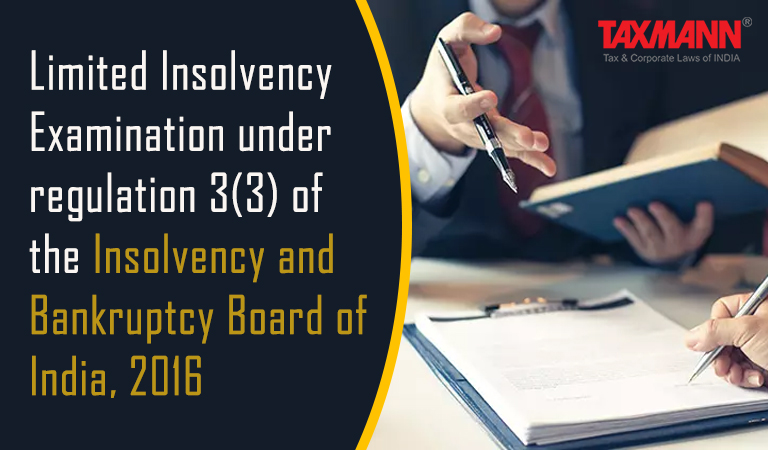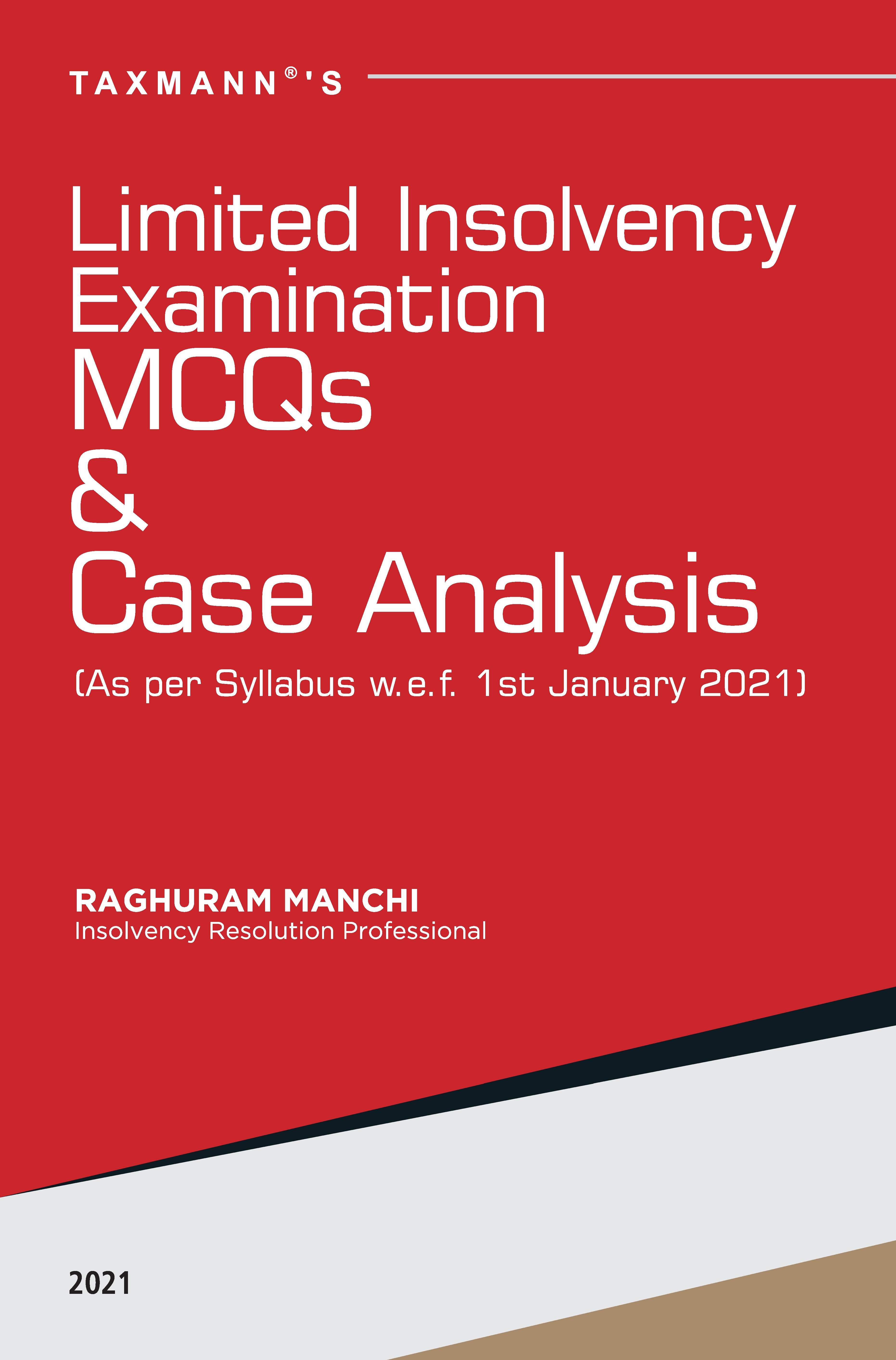Limited Insolvency Examination under regulation 3(3) of the Insolvency and Bankruptcy Board of India, 2016
- Blog|Insolvency and Bankruptcy Code|
- 9 Min Read
- By Taxmann
- |
- Last Updated on 29 August, 2023

Contents
The Limited Insolvency Examination under regulation 3 (3) of the Insolvency and Bankruptcy Board of India (Insolvency Professionals) Regulations, 2016, is to be conducted from the 1st March 2022.
The Insolvency and Bankruptcy Board of India published the syllabus and details of the examinations along with a list of important case laws with 24 additions and 24 deletions from previous year’s list.
The full syllabus along with the required list of case laws for the Limited Insolvency Examination is attached below.
1. Syllabus for Examination
| No. | Subject/Topics | Weight (%) |
| 1 | The Insolvency and Bankruptcy Code, 2016 (Code) | 04 |
| 2 | All Rules, Regulations and Circulars notified under the Code | 06 |
| 3 | Business Laws:
(i) The Companies Act, 2013 Chapter III-Prospectus and Allotment of Securities Chapter IV-Share Capital and Debentures Chapter V-Acceptance of Deposits by Companies Chapter VI-Registration of Charges Chapter VII-Management and Administration Chapter IX-Accounts of Companies Chapter XV-Compromises, Arrangements and Amalgamations Chapter XVII-Registered Valuers Chapter XVIII-Removal of names of the companies from the register of companies Chapter XX-Winding Up Chapter XXVII-NCLT and NCLAT Chapter XXVIII-Special Courts Chapter XXIX-Miscellaneous (ii) The Partnership Act, 1932 (iii) The Limited Liability Partnership Act, 2008 (iv) The Indian Contract Act, 1872 Of contracts, Voidable Contracts and Void Agreement (Sections 10-30); Contingent Contracts (Sections 31-36); Performance of Contract (Sections 37-61); Novation, Rescission and Alteration of Contracts (Sections 62-67); Consequences of Breach of Contract (Sections 73-75); Contracts of Indemnity and Guarantee and Surety’s Rights (Sections 124-127); Bailment and Pledge (Sections 148-181); Agency (Sections 182238) (v) The Sale of Goods Act, 1930 |
04
|
| 4 | General Laws:
(i) The Negotiable Instruments Act, 1881 |
07 |
| (ii) The Transfer of Property Act, 1882
(iii) The Code of Civil Procedure, 1908 (Sections 9, 10, 11, 26-32, 38-45,6064, 73, 75-78, 89 and Order 21) and the Limitation Act, 1963 (iv) The Prevention of Corruption Act, 1988 (Definition of public servant, Section 7-16 read with Section 29A of the Insolvency and Bankruptcy Code, 2016) and the Prevention of Money Laundering Act, 2002 (Sections: 2-8, 48, 63, 67, 71, 72) (v) The Recovery of Debts and Bankruptcy Act, 1993 (vi) The Arbitration and Conciliation Act, 1996 (vii) The Securitisation and Reconstruction of Financial Assets andEnforcement of Security Interest Act, 2002 (viii) The Micro, Small and Medium Enterprises Development Act, 2006: (Classification of enterprises, Advisory committee, Memorandum of micro, small and medium enterprises, Delayed payments to micro and small enterprises) (ix) Real Estate (Regulation and Development) Act, 2016 (Sections: 2, 4, 5, 11, 17, 18, 20, 23, 31, 34, 36, 37, 38, 40, 41, 42, 58, 59, 69, 70, 71, 79, 80, 85, 86, 88, 89, 90) (x) Securities Contracts (Regulation) Act, 1956 (Contracts and options in securities, listing of securities, Offences, penalties, and adjudication) and the following SEBI Regulations: – • Securities and Exchange Board of India (Substantial Acquisition of Shares and Takeovers) Regulations, 2011 • Securities and Exchange Board of India (Listing Obligations and Disclosure Requirements) Regulations, 2015 • Securities and Exchange Board of India (Issue of Capital and Disclosure Requirements) Regulations, 2018 • Securities and Exchange Board of India (Delisting of Equity Shares) Regulations, 2021 |
|
|
| 5 | Finance and Accounts (Corporate Finance; Financial Analysis; Liquidity Management; Tax Planning and GST) | 02 |
| 6 | General Awareness:
(i) Constitution of India: Right to Constitutional Remedies, Provisions ofUnion Judiciary, Provisions of High Courts in the States; Principles of Natural Justice (ii) Rights of Workmen under Labour Laws (iii) Basic Principles of Economics (iv) Financial Markets (v) Basic Concepts of Valuation (vi) Forensic Audit |
02
|
| 7 | Case Laws- Important decisions of Supreme Court and High Courts, Decisions of NCLAT and NCLT relating to Corporate Insolvency Resolution, Corporate Liquidation, Voluntary Liquidation and Fast Track Resolution Process. There will be five questions carrying one mark each.
(List of cases given in Annexure) |
05
|
| 8 | Case Studies:
There will be comprehensions each narrating a case and there will be questions based on the narrative: a) Case study on Corporate Insolvency Resolution Process & Liquidation Process (10 questions x 2 marks each = 20 marks) b) Case study on Corporate Insolvency Resolution Process & Liquidation Process (10 questions x 2 marks each = 20 marks) c) Case study on Pre-Packaged Insolvency Resolution process (4 questions x 2 marks each = 08 marks) d) Case study on Individual Insolvency Resolution and Bankruptcy (4 questions x 2 marks each = 08 marks) e) Case study on Business and General Laws given at Sl. No 3 & 4 (4 questions x 2 marks each = 08 marks) f) Case study on Business and Professional Ethics (3 questions x 2 marks each = 06 marks) |
70
|
| TOTAL | 100 | |
Note: Wherever any law (an Act of Parliament or any Rule/Regulation) is referred to in the syllabus, the same shall be taken as in force as on 28th February 2022. This means that any amendment in such laws, Acts or Rules/Regulations effected after 28th February 2022 shall be ignored.
2. Details of Examination
-
- The examination is conducted online (computer-based in a proctored environment) with objective multiple-choice questions;
- The examination centres are available at various locations across the country;
- The examination is available on every working day;
- A candidate is expected to thoroughly read the relevant Frequently Asked Questions (FAQs) on Limited Insolvency Examination placed on the IBBI website before registering/enrolling for the examination;
- A candidate may choose the time, the date, and the Examination Centre of his choice for taking the Examination. For this purpose, he needs to enrol and register at https://ibbiliexam.onlineregistrationform.org/IBBI;
- A fee of Rs.1770 (Seventeen hundred and seventy rupees) is currently applicable on every enrolment;
- The duration of the examination is 2 hours;
- A candidate is required to answer all questions. No marks will be awarded if a question is not attempted;
- A wrong answer attracts a negative mark of 25% of the marks assigned for the question;
- A candidate needs to secure 60% of marks for passing;
- A successful candidate is awarded a Pass certificate by IBBI;
- A candidate is issued a temporary mark sheet on submission of answer paper;
- No workbook or study material is allowed or provided;
- No electronic devices including mobile phones and smart watches are allowed;
Further changes, if any, in the above details of the Examination will be provided subsequently.
3. List of Important Cases for Limited Insolvency Examination
| Case Law | Syllabus 2021 | Changes | Syllabus from 1st March 2022 |
| Supreme Court Cases | 17 | 11 new cases, 1 deletion | 27 |
| High Court Cases | 9 | 2 new cases, 2 deletions | 9 |
| NCLAT Cases | 17 | 9 additions, 9 deletions | 17 |
| NCLT Cases | 17 | 12 deletions, 2 additions | 7 |
| Total | 60 | Additions: 24; Deletions: 24; |
60 |
| Sl. No. | NCLT Cases |
| 1. | In the matter of Aircel Limited [MA-337/2018 in C.P. (IB)-298/(MB)/2018 and MA-336/2018 in C.P. (IB)-302/(MB)/2018] |
| 2. | In the matter of Adhunik Metaliks Ltd. CA No. 118- CTB-2019 Connected with TP No. 44lCTBl20l9 Arising out of CP (IB) No. 373/KB/2017 |
| 3. | In the matter of Jet Airways [CP(IB)-2205/MB/2019] |
| 4. | In the matter of Pal Infrastructure & Development Pvt. Ltd, [IA No. 2504/2019 and other applications] |
| 5. | In the matter of Bharati Defense and Infrastructure Ltd. [CP 292/I&B/NCLT/MAH/2017] |
| 6. | In the matter of Viceroy Hotels Ltd., [CP No. IB/219/7/HDB/2017] |
| 7. | In the matter of Bhatia Coke and Energy Limited [IBA-307-2019] |
4. Taxmann’s Limited Insolvency Examination MCQs & Case Analysis
Taxmann’s Limited Insolvency Examination MCQs & Case Analysis provides the Case Laws for the Limited Insolvency Examination, that are prescribed by the Insolvency & Bankruptcy Board of India (IBBI) in the syllabus, revised from 1st January 2021.
The Present Publication is the Latest Edition, updated till 31st December 2020, authored by Raghuram Manchi, with the following noteworthy features:
-
- Coverage of 60 Judgements delivered by various Courts & Tribunals and prescribed by IBBI
- Simple Language to understand the concepts in the Case Laws, especially from the point of view of passing the Limited Insolvency Examination
- Short Notes are given for each case, in the form of an executive summary without resorting to legal jargon(s) or paraphrasing
- Section-wise Table has also been incorporated, so that the reader can understand which case is to be read, with the respective section
- Summaries of Last-minute Revisions are incorporated, in a tabular format with the following details:
-
-
- Case Name
- Brief
- Related Section
-
-
- 350+ MCQs to test the readers conceptual understanding of the respective section as well as the respective case law
Disclaimer: The content/information published on the website is only for general information of the user and shall not be construed as legal advice. While the Taxmann has exercised reasonable efforts to ensure the veracity of information/content published, Taxmann shall be under no liability in any manner whatsoever for incorrect information, if any.

Taxmann Publications has a dedicated in-house Research & Editorial Team. This team consists of a team of Chartered Accountants, Company Secretaries, and Lawyers. This team works under the guidance and supervision of editor-in-chief Mr Rakesh Bhargava.
The Research and Editorial Team is responsible for developing reliable and accurate content for the readers. The team follows the six-sigma approach to achieve the benchmark of zero error in its publications and research platforms. The team ensures that the following publication guidelines are thoroughly followed while developing the content:
- The statutory material is obtained only from the authorized and reliable sources
- All the latest developments in the judicial and legislative fields are covered
- Prepare the analytical write-ups on current, controversial, and important issues to help the readers to understand the concept and its implications
- Every content published by Taxmann is complete, accurate and lucid
- All evidence-based statements are supported with proper reference to Section, Circular No., Notification No. or citations
- The golden rules of grammar, style and consistency are thoroughly followed
- Font and size that’s easy to read and remain consistent across all imprint and digital publications are applied




 CA | CS | CMA
CA | CS | CMA
